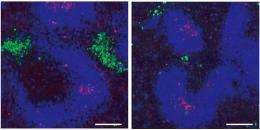Awaiting orders to retaliate

(Medical Xpress) -- When immune system B cells are alerted to the presence of a threat within the body, they form structures called germinal centers, which serve as ad hoc headquarters for marshaling a targeted immune response. These cells subsequently differentiate into plasma cells, which produce antibodies directed against foreign entities, or memory cells, which retain the capacity to become plasma cells if the same threat reappears in the future.
The extracellular signal-regulated kinase proteins (ERK1/2) are integrally involved in the early stages of this process, making it a challenge to assess their subsequent contributions. “If we delete both ERK genes entirely, differentiation of B cells is impaired and we cannot analyze the function of ERKs during the immune response,” explains Kohei Kometani, a researcher in Tomohiro Kurosaki’s group at the RIKEN Research Center for Allergy and Immunology, Yokohama.
To address this challenge, Tomoharu Yasuda and Kometani developed transgenic mice in which ERK expression is lost only after the initial differentiation of B cells. Their initial results were striking; following vaccination with a highly immunogenic antigen, ERK-deficient mice showed a 10- to 40-fold reduction in antibody production (Fig. 1). This selective deletion of the two ERK genes led to a sharp decrease in the number of antigen-specific plasma cells but had little effect on memory cell counts. The researchers determined that these signaling factors appear to directly facilitate plasma cell maturation. “It was surprising that ERKs regulate differentiation but do not affect cell proliferation, because many people think of the ERKs as important molecules for cell growth,” explains Kometani.
Several proteins known as transcription factors contribute to the maturation of plasma cells by turning key genes on or off. Blimp-1 is among the most important of these, as it also helps to inhibit transcription factors that maintain germinal center B cells. Yasuda and Kometani determined that the gene encoding Blimp-1 is a primary target of ERK signaling. They also identified another protein, Elk-1, which appears to be an important intermediary in this process.
As their findings also indicate that other signaling pathways are likely to intersect with ERK signaling in this developmental process, Yasuda and colleagues hope to explore this complexity in the future. “Harmful or excess antibody production are sometimes the cause of autoimmunity and allergy,” he says, “and from this point of view, it may be interesting to check the involvement of not only the ERKs, but also the molecules upstream and downstream.”
More information: Yasuda, T., Kometani, K., Takahashi, N., Imai, Y., Aiba, Y. & Kurosaki, T. ERKs induce expression of the transcriptional repressor Blimp-1 and subsequent plasma cell differentiation. Science Signaling 4, ra25 (2011). stke.sciencemag.org/cgi/conten … /abstract/4/169/ra25


















